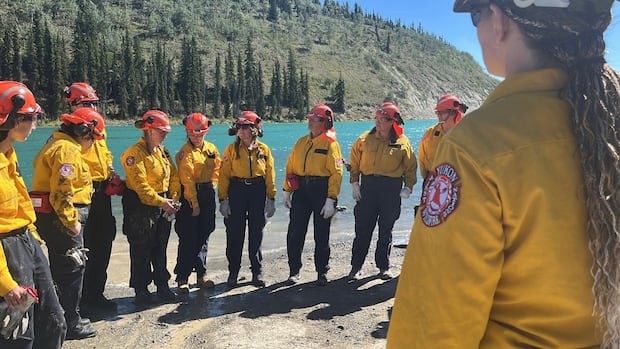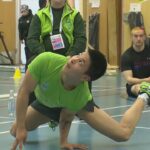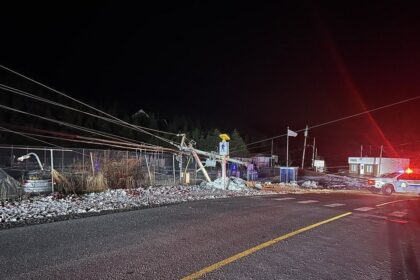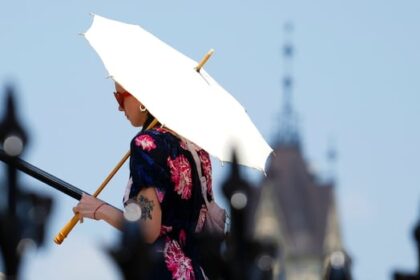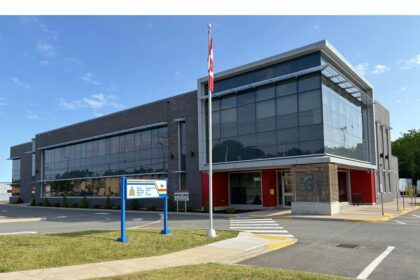NorthThe week-long course gives women and 2SLGBTQ+ people the chance to try out the training and equipment involved in wildland firefighting. Course gives women and 2SLGBTQ+ people the chance to try firefightingIsabella Calissi · CBC News · Posted: Aug 11, 2025 3:24 PM EDT | Last Updated: August 11Participants in the Women on Wildfires (WOW) training program gather to share feedback after the pump exercise. Fifteen women and 2SLGBTQ+ people participated in this year’s program. (Isabella Calissi/CBC )Yukon First Nations Wildfire held its first Women on Wildfires (WOW) training program last week — a week-long course that gives women and 2SLGBTQ+ people the chance to try out the training and equipment involved in wildland firefighting. Elise Brown-Dussault, the program’s manager, says she started the training because she wished it was around when she was younger. “Initially [it was] something I was always curious about trying, but I would tell myself, ‘It’s gonna be all men’ or, ‘I don’t know how to use small engines. Who knows if I’m fit enough?'” Participants ‘jigging’ the water line in the Yukon River. This is to get water suction into the small pump. (Isabella Calissi/CBC )She said she was struggling with these thoughts even though she did a lot of physical activities that were similar to what wildland firefighters do — like backpacking. Brown-Dussault said one of the big hurdles for a lot of people curious about wildland firefighting is the fact it’s a male-dominated field. According to a 2024 survey by the Canadian Association of Fire Chiefs, only 12 per cent of firefighters who responded to the survey were women. For gender diverse people, there was no data. Brooke Tanaka firing off the high-pressure hose during the pump exercise. (Isabella Calissi/CBC)”I think a lot of minorities, especially women and queer people, they feel maybe a little bit intimidated by the male-dominated nature of wildland fire,” she said.During the week, participants learned fire fundamentals, like how to manage stress, use hand tools, and operate a basic pump system — similar to what they’d use in the field. There was also a big focus on fitness.The program doesn’t replace the training needed to become a wildland firefighter, but gives people a chance to try it out and see if it’s something they want to pursue. Alanna Bernarde is a WOW instructor and has been working as a wildland firefighter for the last four years. She adds, beyond being potential intimidation factor, a difference in physicality can be a barrier for some potential recruits. A participant uses a hand clamp to adjust the water pressure coming out of the hose. (Isabella Calissi/CBC)”A big portion of it as well is just teaching the women how to do these things because we’re not six-foot-six and 200 pounds like all the other guys. Some of us are five-two and like 130 pounds. So it’s just, how do we work around that and how do we work with our bodies rather than against [them]?”M Khonina, a WOW participant, is visiting from their studies as a structural firefighter in B.C. They’ve wanted to try out wildland firefighting since the 2023 fire season. “I think we need a lot more opportunities for these safer environments to try things, to fail, to get a chance to see yourself in this role and also to see people who can model it for you,” they said. “Seeing women and gender diverse people in the fire service was really inspiring and told me that maybe I can do that as well.”One pump prep team waiting for their teammates to fire off the hose during the exercise before they pack up the system. (Isabella Calissi/CBC)Brooke Tanaka, another WOW participant, found out about the program through work and says she’s going to sign up for the actual training needed to become a wildland firefighter next year. “I grew up somewhere where we didn’t have opportunities like this. So it was really good to know that there’s actually a career path that helps women get into their first responders section,” she said. ABOUT THE AUTHORIsabella Calissi is a reporter with CBC North in Whitehorse. Reach her at: isabella.calissi@cbc.ca.
Friday, 6 Feb 2026
Canada – The Illusion
Search
Have an existing account?
Sign In
© 2022 Foxiz News Network. Ruby Design Company. All Rights Reserved.
You May also Like
- More News:
- history
- Standing Bear Network
- John Gonzalez
- ᐊᔭᐦᑊ ayahp — It happened
- Creation
- Beneath the Water
- Olympic gold medal
- Jim Thorpe
- type O blood
- the bringer of life
- Raven
- Wás’agi
- NoiseCat
- 'Sugarcane'
- The rivers still sing
- ᑲᓂᐸᐏᐟ ᒪᐢᑿ
- ᐅᑳᐤ okâw — We remember
- ᐊᓂᓈᐯᐃᐧᐣ aninâpêwin — Truth
- This is what it means to be human.
- Nokoma


